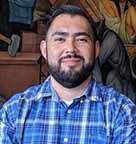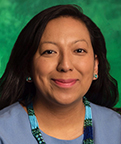Alfredo Carlos, Ph.D.
Assistant Professor, Labor Studies
California State University, Dominguez Hills
Dr. Alfredo Carlos recently joined the California State University, Dominguez Hills as an Assistant Professor in the Department of Labor Studies. He was the interim Director of Chicano Studies at Eastern Washington University and a former faculty Member in Political Science at California State University, Long Beach. He is also the Founder & Director of the Foundation for Economic Democracy an organization that promotes democratic worker ownership of businesses and community ownership of land and housing. He grew up in the LA/LB Harbor area in an immigrant working class family and community, which has informed his education and given him purpose to struggle for economic and racial justice in solidarity with working people trying to live with dignity.
He holds a Ph.D. in Political Science from the University of California, Irvine where he specialized in the fields of Political Economy, and American Racial and Urban Politics. He earned his M.A. in Political Science from California State University, Long Beach with a focus in Comparative Politics and International Relations and has a B.A. is in History and Chicano Studies from the University of California, Santa Barbara. He is the co-author of The Latino Question (Pluto, 2018), which was named “Best Book in Latino Politics” in 2019 by the American Political Science Association’s Latino Politics Caucus.
Vision for NACCS
I have been active in NACCS in various ways since 1998 when I first attended as a student. I served as the Southern California Foco Rep from 2014-2016 and co-founded the Labor Caucus in 2016 and have been its Co-Chair since.
I am running for an At-Large Rep position because I want to help the organization which has tremendously helped my academic trajectory. NACCS is where I was able to begin to see myself as an intellectual and it is where I want to help contribute to mentoring the next generation of scholars. I started the Labor Caucus with colleagues because I wanted to center Political Economy and Labor and I want to contribute to the leadership team to continue to develop and promote research and young scholars who are interested in institutional analyses that help improve the quality of life of working people. My community and labor organizing background and career trajectory have been immensely influenced by the working class history of Chicana and Chicano Studies that is rooted in empowering our communities. I want to continue that work advocating for and mentoring scholars interested in Community Based Action research that connects institutional analysis and research, with policy making and economic restructuring to collectively contribute to improving the lives of working people, those from our communities in solidarity with others.
Jennifer Gómez Menjívar, Ph.D.
Associate Professor, Media Arts
University of North Texas
Dr. Jennifer Gómez Menjívar is Associate Professor of Media Arts at the University of North Texas. She holds a Ph.D. in Latin American and Latina/o/x Studies from The Ohio State University. Her research interests include Indigenous Sovereignty Media, Latin American and Latinx Media, Grassroots and Participatory Media Practices, Cinematic Adaptation, Digital Culture, Critical Theory, and Media Linguistics. Her books include Tropical Tongues (University of North Carolina Press, 2018) and the co-edited anthology, Indigenous Interfaces Spaces, Technology, and Social Networks in Mexico and Central America (University of Arizona Press, 2019). Her forthcoming volumes include Hemispheric Blackness and the Exigencies of Accountability (University of Pittsburgh Press, 2022) and Améfrica in Letters (Vanderbilt University Press, 2022). Her articles have appeared in venues, such as the Journal of Pidgin and Creole Languages, Applied Linguistics, Chasqui, Diálogo, Hispanófila, Romance Notes, Transmodernity, NAIS Journal, and Mesoamérica, among others. She also contributed an essay to the NACCS “The Queer Turn” Conference Proceedings (2018) that was titled “Moises Serrano’s Forbidden: A North Carolinian DREAMer’s Twist on Chicanx Memoir, Testimonio, and Geography.”
Leadership Statement
My undergraduate degree is from CSUN (Cal State University Northridge), and as an emerging scholar I had the amazing opportunity to take classes with legendary scholars in Chicana/o Studies. I learned a lifetime’s worth of knowledge from Dr. Rudy Acuña, Dr. Mary Pardo, Dr. Marta López-Garza, and Muralist Extraordinaire Yreina Cervantes, and many others in the department. I also had the incredible opportunity to graduate with a minor in Central American Studies, a program that was born within CSUN’s Chicana/o Studies department. My experiences as an undergraduate student taught me about our experience as a community, but also about the consistency, dedication, and adaptability that we need as leaders in the field. These were the lessons I brought with me when I took on the role of Midwest Foco leader in 2018 and in my final year as Midwest Foco leader during the COVID-19 pandemic. I am eager to serve as a leader with knowledge of our history and struggles, as well as deep personal knowledge of three NACCS membership areas (California, the Midwest, and Texas, where I teach, organize, and reside today) and my NACCS scholarly networks beyond those where I have learned and lived. Colegas, NACCS has faced challenges since it was founded, and even today, COVID continues to exert pressures on us. If elected to NACCS as a member of the Board, I would bring together my networks and resources to make our organization stronger. My principal task would be to fortify communication between the Board, Foco, and Caucus leaders through consistent reports on Board activities and communications, as well as more frequent check-ins about Foco and Caucus needs moving forward. This consistent and dedicated communication would allow me to accurately represent the membership during Board meetings, including decisions regarding annual conference planning and official statements in times of crisis. Despite the ongoing concerns at this time in our history, I believe that serving NACCS with this leadership vision will encourage growth and solid partnerships between us all. I am excited about what we can accomplish together.